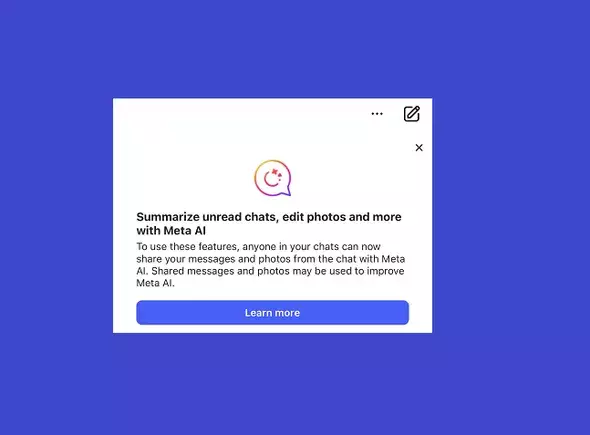In recent developments at Meta, the introduction of AI features in messaging apps has sparked anxiety among users regarding their privacy. With an increasing reliance on artificial intelligence to enhance user experiences, it is crucial for users to understand how this integration affects their private communications. The recent pop-up notifications from Meta serve as a harbinger of a bigger conversation around data privacy that begs the attention of every user on platforms like Facebook, Instagram, Messenger, and WhatsApp.
For many individuals who utilize Meta’s extensive suite of applications daily, the recent alerts indicating the inclusion of AI capabilities into their direct messages has raised significant questions. The pop-up essentially informs users that any conversations within these platforms could feed into Meta’s AI systems. Users are advised to exercise caution when sharing sensitive information, as others in the conversation may choose to invoke Meta AI, exposing that data to potential analysis and training of the AI models—intensifying fears about user privacy.
In each notification, Meta makes it clear that while it attempts to anonymize and remove personal identifiers from the data shared with its AI, nuances in data handling might mean some data remains identifiable. This raises an important ethical question about the extent to which users can trust Meta with their private content, and what it truly means to “be mindful” in such a context.
One of the underlying issues with Meta’s new feature is its perceived value versus the potential risk it presents. The idea of having an AI at the prompt of a chat might sound appealing—to get quick answers or assistance without having to navigate away from the conversation. However, the relative triviality of these AI interactions raises concerns about why users would even want to include AI tools in their chats when a dedicated AI conversation could be initiated separately.
Taking a broader perspective, Meta’s attempts to tout AI innovations appear more self-serving, showcasing its technological prowess rather than genuinely enhancing user experience. In essence, users could find themselves weighing the convenience of AI interaction against the desirability of safeguarding their private information—a choice that might lead many to avoid the feature altogether.
The pushback against the integration of AI in personal communication also hinges on the false sense of consent often felt by users. With vague privacy agreements that most people toggle through without thorough examination, a significant number have unknowingly consented to sharing their data. Acknowledging this reality, the pop-up notifications serve as a belated reminder of the permissions granted long ago, further complicating the users’ perception of their privacy rights.
For users seeking to navigate this intertwined web of convenience and privacy, the choices are slim: abstain from AI queries in chats, delete sensitive messages, or even disengage from using Meta apps altogether. For many, these alternatives could feel like punitive measures.
At the core of this transition into AI-infused messaging lies an ethical conundrum: to what extent are companies like Meta responsible for protecting user data? And, to what length must users go to protect themselves? While Meta’s legal right to process information exists, the ramifications on user trust generate a concerning backdrop that makes individuals reconsider their communication habits online.
The chances of an AI reversing private conversations into discernible personal data might be statistically low, yet the mere possibility creates a lingering unease. In an era where privacy is increasingly fragile, companies must tread carefully on the delicate balance between innovation and ethical responsibility.
Ultimately, the onus falls on users themselves to be proactive in safeguarding their privacy in the age of AI. As Meta continues to integrate advanced technologies into its platforms, remaining conscious of the implications of this influx should remain paramount for all users. The best precaution: think before you share, and when in doubt, separate personal conversations from AI inquiries. Only then can users navigate this complex landscape with both awareness and assurance.


Leave a Reply